Alyssa Hubbard's Blog, page 13
July 28, 2014
9 Things you need to know before you start to query.
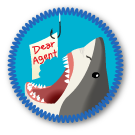
The QueryShark badge
Not too long ago, I wrote a post on how to format a manuscript. Then, I wrote a post on things you need to know to traditionally publish.
Now it is time to learn how to actually go about getting published.
The number one thing you need to learn to land an agent or publishing deal is to query.
What is a query you might ask?
The simplest way I can think to explain it is to go to your bookshelf/book pile, pluck your favorite book off the top, and take a look at the back cover or the inside flap where the description of the book is.
This is essentially a query.
It is a brief description of your book that will entice readers (or agents, or publishers) to read pages. It is your marketing plan without actually saying, “Please, oh please, read me.”
Want to know how to write a back cover blurb? Click here to read my tips and tricks!
90% of what you need to put in a query is what you would want to put on the back of your book. Here is what you need to know before you start querying:
READ THE SUBMISSION GUIDELINES
I can’t say this enough. There is an industry standard when it comes to querying, but that doesn’t mean every single agent will have the same exact guidelines. Like I’ve said before, the number one reason for rejection is not reading the guidelines and being auto-rejected because the agent feels you are wasting their time. If you couldn’t take the time to read the guidelines, how could you have taken the time to polish your manuscript? To polish the query you’re sending to them? Just do it. Those five minutes you spend reading guidelines could very well make the difference between a request for pages and a form rejection.
YOU WILL BE QUERYING MORE AGENTS THAN PUBLISHING HOUSES
That’s just how it is. Most publishers won’t take you on unless you are represented by an agent – someone who knows the business. They are the gatekeepers. So don’t be surprised when you go on the hunt for publishers and no one is taking unsolicited, unrepresented authors. It’s to protect them from the ever-growing slush pile agents are having to sift through. Plus, they don’t want to have any legal battles with an unrepresented author who may not understand certain contracts or conditions. It’s just the business.
YOU DON’T HAVE TO HAVE PUBLISHING CREDITS
You don’t. They’re nice, sure, but you don’t have to have them. Don’t make it out like it is a huge deal either. Just at the end of your query, before your closing, simply put (… this is my first novel.) Simple. You aren’t the focus in a query. Your manuscript is. Don’t get hung up on the finer details.
EDIT YOUR QUERY AS MUCH AS YOU EDITED YOUR NOVEL
A standard query should be one page long. No more. Granted, there are exceptions, but for the most part, you shouldn’t go past a page. You want to take your novel, strip it down to the bare, bare bones without giving away the ending and there is your query. It sounds easier than it actually is. You should have as many revisions of your query as you did your novel. If you haven’t even revised your novel, don’t write a query. Want tips on editing a query? Click here!
DON’T QUERY UNTIL THE NOVEL IS DONE
You’re querying for a deal. In exchange for this deal of representation, you provide a finished and polished novel.
MOST QUERIES SHOULD BE IN THIRD PERSON
Even if your novel is in first-person, most first person queries are seen as gimmicks. What is third person? He, she, it. He did this. She said this. It did such and such.
FORMATTING (SOLELY FOR EMAILS. READ THE SUBMISSION GUIDELINES FOR FURTHER INSTRUCTION. SHOULD BE PASTED IN THE BODY OF THE EMAIL)
Dear Agent Name,Ashley Judd insertdramaticvoiceandstunningrevelationsoftriumphloveandacceptance, yatta yatta, blah, blah, blah.
THE DRAMATIC VOICE AND STUNNING REVELATIONS is a horror novel complete at 45,000 words. It is my debut novel.
Thank you for your time and consideration.
Alyssa Hubbard
DO NOT INCLUDE YOUR MANUSCRIPT, LINKS, OR ATTACHMENTS IF QUERYING BY EMAIL
Certain spam filters hate links and attachments. Any and all queries, if requested by email, should be put into the body of the email. It shouldn’t be a wall of text. Make some white space. Don’t include anything that isn’t requested by the agent. Do not submit to an agent that just wants your full manuscript without prior query. That should be a red flag. A synopsis is fine, but only if it is in the guidelines.
READ AS MANY QUERIES AS POSSIBLE
The best way to learn how to write is to write and to read. The best way to learn to query is read and write queries. My favorite query website is QueryShark. It’s a wonderful place to read bad queries, their revisions, and an actual agent’s feelings on queries. That blog is an extremely valuable tool that I visit quite often. You should, too.
How do you feel about these tips? Are you query ready? Have you queryed before? What has been your experience? Let me know, and comment below.
Thanks for reading.
-Lissy
Want to be a beta reader? Click here to fill out the contact sheet, and let me know!
Want to guest post? Want to trade posts?
Same goes to you!
Don’t be shy!
Want to check out some books?
CLICK HERE
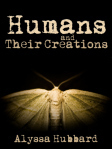
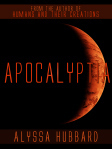
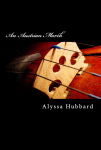
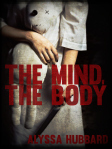
Filed under: Writing and Marketing Tips, Writing Tips








July 14, 2014
You are going to be perfect
“My mom said I’m going to be…”
“My dad said I should…”
“My friends say I will…”
“Everyone is telling me I should…”
“I’m tired of people telling me how I’m going to be and how I should live my life.”
Well, I’m going to tell you.
You’re gonna be perfect because you are going to become what you want to become.
The biggest mistake you can make in your life is changing your life goals and setting your dreams aside for what others see in you.
Money isn’t everything.
Money won’t always be there. It’s this tangible thing that can grow instantly, but fade just as quickly as it is gained.
Happiness is something you can cultivate for a lifetime, and you can never have enough of it.
Spend your life obtaining your happiness, not making others happy.
You are gonna be what you want to be, which is perfect because it is what you want, and that’s all that matters.
And no matter what, I am proud of you, for standing up for yourself and your dreams – your happiness.
-Lissy
Want to check out some books?
CLICK HERE




Filed under: Personal Posts








July 7, 2014
4 Things Catherine taught me about writing

WARNING: THERE WILL BE SPOILERS. READ AT YOUR OWN RISK.
First a little background on the game Catherine, as described on the Catherine Wiki:
Catherine is an M-rated horror/romance/puzzle/adventure video game from Atlus USA, released on Xbox 360 and PlayStation 3. The game is developed by the same team that created Persona 3 and Persona 4: as Director, as Character Designer, and Shōji Meguro as Sound Composer.
It deals heavily with the themes of commitment, relationships, infidelity, maturity and love, while intertwining the horror and mystery of a rash of unexplained deaths of young men, rumored to be the “Women’s Wrath”: vengeance against the unfaithful.
The story revolves around Vincent, his long-term girlfriend Katherine, and his subsequent affair with Catherine. Following the affair, he is plunged into nightmares each time he sleeps, which makes up the puzzle/action part of the game. Each night within his dream, Vincent must push and pull blocks from a tower to create a path to the top, all the while racing against a time-limit or outrunning bosses which are manifestations of his real-life fears.
During the day, Vincent can freely explore and talk to his friends at the bar, listen to music at a jukebox, send and receive text messages, order drinks, play an arcade game, and experience the narrative of his struggle of choosing between Katherine and Catherine. There are 8 possible endings based on the various choices the player makes throughout the game.
As you can probably tell, this is one of the run-of-the-mill Japanese horror games with endings separated out between “Good” and “Bad” endings depending on which woman you decide to pursue a relationship with, as well as how you treat other NPCs in the game. I’m a sucker for anything reminiscent to my anime fanatic days, then throw in a puzzle? Plus romance and horror? I was hooked from the start.
I’ve written about other games like Minecraft, Ico, Shadow of the Colossus, and Animal Crossing: New Leaf! Click the titles to see what I learned!
And of course, my writing life always intermingles with my gaming life, so here is what I learned from my time with the wonderful game Catherine:
Your characters need motivation.
They can’t just do things, just to do them. I mean, sure, I do some random crazy things, but most people don’t do that. So you have to give them a reason. Vincent is in love with Katherine, so why would he cheat on her? The creators had to give Katherine a bit of a controlling, pressuring side to push Vincent to seek a freer partner in Catherine. Otherwise, we would have no plot, or on the flip side, Vincent would just be a dumb asshole. Vincent is still a dumb asshole, but at least we can sympathize with him a little. He has a reason. It’s a crappy reason, but a reason.
People should somewhat like your main character.
They don’t have to necessarily love them, but they should at least be able to sympathize and root for them. Vincent is scum. I didn’t like him, but I felt bad because Katherine was somewhat mean to him… and I loved Katherine, so that was hard for me to admit in the end. I didn’t agree with what Vincent did, but there was a part of me that felt bad for him, too. Katherine made me want to like him. Which leads me to my next point:
Side characters are important.
The main character is Vincent. He is you, you are him. But Vincent’s story would be nothing without Catherine and Katherine, plus all of his friends. This is a very plot-driven game. You connect stories from the people you meet, and every decision you make interacting with these characters plays a role in what ending you get. If you ignore characters, they may die, which, in turn, will cause Vincent to miss out on an interaction. It makes a huge difference. Don’t forget those side characters.
Your character’s decisions have consequences.
They can’t do something bad and expect to get away without a scratch, unless of course they are master thieves, then I guess that could happen… but for our regular characters, there are scratches. Lots of them. Vincent is a cheater and depending on who you ultimately choose to be with, he doesn’t get away with the perfect girl with just a “Sorry, love ya.” Oh no, he has to go through hell to win her back – literally. Consequences create plot. Don’t be afraid to punish your babies.
This game was interesting, fun, and kept me going until the very end, and that’s how I want my books to feel. Have you played Catherine before? Think you will? How do you feel about these tips? Find them helpful? Let me know, and comment below!
Thanks for reading!
-Lissy
Want to be a beta reader? Click here to fill out the contact sheet, and let me know!
Want to guest post? Want to trade posts?
Same goes to you!
Don’t be shy!
Want to check out some books?
CLICK HERE




Filed under: What Gaming Taught Me, Writing and Marketing Tips, Writing Tips








June 30, 2014
What your desk says about you
As a writer, we all have our special place. The place we feel the most creative and inspired, the place where writing is as easy as breathing, and mine just happens to be my desk.

The Creative Space
This is my desk. My laptop next to my notepad, a cereal bowl, a coke with my name on it, a TV, and if I had moved a few more inches back you’d see my PS4. Something about this area is just me. I’ve written all of my books at my desk, and what about you? What is your area of choice?
What does your area say about you? Let me know, and comment below! Pictures are always fun, too.
Thanks for reading.
-Lissy
Want to be a beta reader? Click here to fill out the contact sheet, and let me know!
Want to guest post? Want to trade posts?
Same goes to you!
Don’t be shy!
Want to check out some books?
CLICK HERE




Filed under: Personal Posts








June 23, 2014
Want to traditionally publish? Here are 8 things you need to know.

Don’t post your work online.
I made this mistake, and I see many others make this mistake. If you want to send your work out to agents and traditional publishers, don’t post it online! It is considered previously published if you do so, and this includes on your own blog, etc. Granted, every publisher and agent has its own opinion as to what “previously published” actually means, but I find it best to avoid posting it all together. Want critiques? It is best to go through private channels (i.e. email, beta groups with a private setting, etc.). Better yet, just pass around physical copies to people you know.
Read the submission guidelines thoroughly.
The number one reason for rejection is because people did not read the submission guidelines. Don’t make this careless mistake. It is easily avoided. Most people assume that if they follow the standard manuscript format , they’re in the clear, but every publisher works differently. Don’t assume the standard can just be passed around anywhere. Just read the damn guidelines.
Most publishers require a writer to be represented.
Publishers feel a writer needs to have representation to be considered for publication, which protects them as well as you. Find agents, submit to them, then they will help you submit to publishers. But remember, agents think like publishers. Agents aren’t going to take on just anybody, and they have rules just like publishers, so read the damn submission guidelines and you may save yourself from a rejection.
Most publishers don’t like simultaneous submissions.
Simultaneous submission – a submission which has been sent to multiple organizations at the same time. It sucks, but they do it so they’re not wasting time on a manuscript that could be picked up any minute. Here’s an example: Let’s say I send you a manuscript for publication consideration. You’re in the middle of it and you think it is damn sexy. This is quite possibly the sexiest manuscript you have ever read in your life, and right before you can tell me how much you love it, I send you this email:
Sorry, not sorry, I signed a contract with someone else. Peace.
Yeah, not cool.
I know it sucks waiting around for, quite possibly, a rejection when you could be submitting to other places and increasing your chances, but there is a reason they do it. Don’t burn bridges by being an asshole and not following the rules.
Don’t lie about simultaneously submitting a manuscript or its status as being previously published.
The worst thing you can do is lie, other than not following the submission guidelines, but we’ve already talked about that. Wanna burn some bridges real quick? Go ahead and lie to a publisher. It pays to have friends in this business. It only takes a second for a publisher to find out if you’re lying. A quick google search of your manuscript, boom, there is your story posted for all the world to see. Those are potential customers they are missing out on because you’re just giving the work away for free. Why would someone pay for something they already can get for free? Definitely not a publisher or an agent. And don’t get yourself stuck by lying about simultaneously submitting. What if two publishers want your work, what then? You’re going to have to tell one you don’t want it. It’s going to piss people off real quick, and information like that spreads fast. Just be honest and do what you’re supposed to. Follow the rules.
It can take months before you hear back. Don’t pester. Be patient.
With the increase of technology, publishers have become more accessible to a much wider base of writers than when most submissions were solely through the mail. This means they’re getting mass amounts of submissions on a daily basis, and sifting through that slush pile takes a long time, especially when they have to find something worth publishing. Unfortunately, unless your name is Stephen King, your manuscript will be somewhere in that slush pile. Don’t be offended, that’s just how it is now. Just wait it out. Most publishers will give you a general wait period in their submission guidelines, as well as a time you can inquire about your manuscript if you haven’t heard back – just one more reason to actually read the damn submission guidelines.
Sometimes, you just won’t hear back.
The way things are now, with such a large slush pile, you may never hear back, which you can take as a rejection. There’s no point in writing them. If you’ve already inquired, and they’ve rejected your work, at least you heard back. If you wrote them, and they still haven’t responded, just move on. They’re too busy to reject you. There’s no point in dwelling on it.
If you are rejected, do not argue with the publisher/agent.
I don’t care if they called it garbage, called you garbage, and danced on your mother’s grave, you need to be the bigger person. I don’t mean you have to send them a “Thank You” note or anything. Just move on. There have been way too many horror stories involving writers fighting with publishers over being rejected. They took the time to reject you. They don’t even have to do that. It sounds strange, but you should be thankful they took the time to reject you. Don’t become one of those horror stories that gets passed around the internet every week. You’ll burn every bridge in the business, and you can kiss any chance at traditional publication good-bye.
So, how do you feel about this list? Does it upset you? Does it all make sense? Are you trying your hand at traditional publication? Have you been successful? Have you experienced any of these things? Let me know, and comment below!
Thanks for reading.
-Lissy
Want to be a beta reader? Go to my home page, fill out the contact sheet, and let me know!
Want to guest post? Want to trade posts?
Same goes to you!
Don’t be shy!
Filed under: Writing and Marketing Tips, Writing Tips








June 16, 2014
What I learned about writing from Animal Crossing: New Leaf
It’s been a long time since I wrote a post about what I’ve learned from video games and how that can be applied to writing.
I’ve actually written two others, one about Minecraft another about Ico and Shadow of the Colossus.
As it has happened with so many other gamers, life has snuck up and taken away my lovely game time. Work, internships, and writing have all had their fun with my gaming time, especially console gaming. To make up for it, I purchased Animal Crossing: New Leaf (ACNL) for my 2DS, a clunky throwback to old school handhelds, which I actually prefer over the new 3DS systems.
But anyway…
And did I fall in love?
I fell. I fell straight into a pitfall seed.
I love this game. It’s mind-numbing. Just how I like them, and with a wide array of NPCs, there’s hardly a dull moment.
Granted, this game isn’t for everyone. If you don’t like the following, steer clear:
Paying off your mortgage only to expand your home and pay that off, etc. etc.
Watering flowers
Running errands
Purchasing furniture and decorating
Taking part in town festivals
Being mayor
Fishing, catching bugs, etc.
Selling said fish and bugs
Working at a coffee shop
Drinking coffee
BALLOONS
Fossils
Museums / Donating to museums
Dance clubs
Buying clothes and trying on new clothes
Talking animals
Yep. That’s the game in a nutshell. It’s wonderful, and there are some pretty great communities to take part in, too. Now, what can we learn about writing from this? Well, onward to the list!
Separating your voice from your characters.
Everyone has their own voice when writing. There will always be a certain part of yourself in every bit of writing you do. Whether it’s things you love, things you hate, a character based off a person or kind of person you hate, there will always be a little bit of you in there. The key is to make their voices different. If you give them all your voice, then you’ve basically made clones of yourself. How did I learn this from ACNL? With 33 different villager characters and set villager personalities, I found that even having two lazy villagers in the same town, didn’t mean I would hear the same things from them. For whatever reason, they just felt different to me. They each had their own voice. You can have similar personalities, but you really shouldn’t have the same voice.
Rules are rules.
Just because you’re mayor in a town of talking animals, doesn’t mean you can do just anything. There are rules, time periods that need to be followed. You have a mortgage to pay, work to be done in the town to keep it nice and to further develop it. And who pays for those developments? You. So you have to make money by catching fish, which come at different times of the day, then wait until you pay it off, plus a day, for it to be done before you begin working on the next project. It’s important to give your characters rules. If they can do anything they want at any time, what would be the point? Where is the conflict? What is your story? You don’t have to make them your everyday Joe’s, but give them rules.
Men don’t have to wear suits and ties/Women don’t have to wear dresses (Click the link to read more on gender in writing!).
I’m not going to lie, this is one of the many problems I have when writing up characters. It’s so easy to fall into the stereotypes of women just being women, and men just being men, when I myself have been made fun of my entire life for being the opposite. I was, and still very much am, a tomboy. I hate makeup, I dislike most dresses, and I’d much rather play video games than go shopping. Shopping literally makes me ill. I’ve been called a dike and a lesbian more times than I can recount. At a certain point in the game, I was able to buy men’s clothing and get male hair cuts. It was then I realized, you don’t have to be feminine to be a woman. I am a woman, and I am not feminine. I have a boyfriend, I have friends, I am woman without subjecting myself to all things stereo-typically woman. A woman can be masculine without being a lesbian, and the same is true for a man being a bit more feminine. This pic says it best:
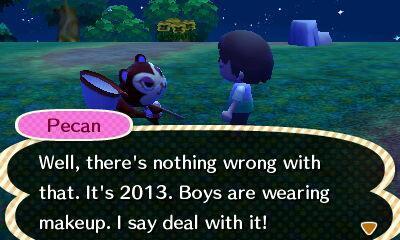
Well, it’s 2014… but you get the idea.
Well, those are my top three. If I think of any more, I may add to this post. The game is still being updated, and I’m still learning as I go along. What have you learned? Have you played Animal Crossing? Any of them? How do you feel about my post? Let me know, and comment below!
Thanks for reading!
-Lissy
Want to be a beta reader? Go to my home page, fill out the contact sheet, and let me know!
Want to guest post? Want to trade posts?
Same goes to you!
Don’t be shy!
Filed under: Personal Posts, Writing and Marketing Tips, Writing Tips








June 9, 2014
How to Write Female and Male Characters
When I am asked this question, I like to refer back to one of my favorite picture sets of all time:

Same goes for men.
But anyway, I know this is a serious question. I’ll give it a serious answer, but first let me reflect on something I’ve recently been toying with. Have you ever thought about writing something without any genders at all? Nothing at all. I’m not saying write a story about a genderless species or aliens (though that is always cool), I’m saying writing a story where even you don’t know the genders until the end. It’s very interesting to see what comes out.
If you’re having to ask this question, maybe this is something you can try. Create a personality, one without a gender or name associated with it. I often pick names of seasons or months just to identify different voices, then at the end go back and see how they feel. Maybe you can try this? See if you like it? Regardless, onward to the post:
Personalities aren’t the same as a gender.
Not all women are feminine, not all men are masculine. Not all women want to be out of the house, some men want to be house-husbands. Not all women like dresses and Gossip Girl, not all men like cars and women, at least not exclusively. Make a personality, give the character likes and dislikes, make a person before you make a woman or a man. It’s much easier to write a character when they have a personality of their own. That way, gender isn’t the only thing that separates them from other characters. It’s easy to say, she’s a woman, he’s a man. It’s much better to say she’s a gamer who likes to read and make fart jokes, and he’s an outgoing socialite. See? Personality isn’t synonymous with gender.
Gender identifiers.
If you have a character with a stunning personality, or shitty personality, whatever, and you still feel like your character’s gender isn’t “real,” then here is a short list of things often associated with men and women:
This can differ depending on their jobs or personalities, so keep that in mind, too. Don’t sacrifice your character’s personality for these stereotypes. Not all of them apply to every woman or man, and these shouldn’t be considered 100% factual. A lot of these are plain wrong, but coming from beta readers, this has been my experience, which is unfortunately skewed.
-In dialogue men tend to have shorter sentences, women tend to be more detail-oriented with their speech.
-Men tend to “worry” less than women. A woman will often times have more nervous body language, men more relaxed.
-Women are thought-oriented. If you have lengthy expositions of just thought, it is more likely to be considered a woman.
-Women tend to multitask (i.e. listening to music while reading), while men are often found doing a single task.
-Women have closed body language (arms crossed or held close to the body, legs crossed), men are more open (arms resting on their knees, legs spread).
-Men are less likely to touch each other, women are a lot more personable and polite with one another (though neither may feel that way).
In short, just write the character. Everyone’s different, and there is no way you can encapsulate the entire gender within a single character. So, what do you think? Are you as disappointed with the gender stereotypes as I am? Do you agree that personality isn’t synonymous with gender? Anything you’d like to add? Let me know, and comment below!
Thanks for reading!
-Lissy
Want to be a beta reader? Go to my home page, fill out the contact sheet, and let me know!
Want to guest post? Want to trade posts?
Same goes to you!
Don’t be shy!
Filed under: Writing and Marketing Tips, Writing Tips








June 2, 2014
Things Beta Readers Should Know

I’ve already made one post on general beta reading for writers, and now this will be directed at beta readers.
If a writer requests a beta reader, that doesn’t mean they will send this first draft to everyone. Often times, I will send it to the first few, then make changes, and send that draft to the next group of beta readers. I want fresh eyes, always.
If a writer requests a beta reader, that doesn’t mean they will choose you. It happens, sometimes. Most of the time, it’s nothing personal. We’ve all had different experiences with beta readers, and we all have a certain things we look for in beta readers. If I think I’ve already found what I’m looking for, then I may not send a draft to some beta readers. Once again, it happens.
“I like it,” usually isn’t what I’m looking for. It’s nice to hear, but if that’s all you have to say, then it wasn’t worth my time. Sorry. If you want to say “I like it” then the best thing you could do is follow it with “because…” and explain why you like it. It lets us know what we did right.
Don’t be afraid to tell me you don’t like it. I’m a writer. I’ve been rejected more times than I care to admit. You telling me you don’t like my work isn’t going to hurt my feelings. If the writer can’t handle it, becomes defensive, and is just plain rude, then that’s their problem, not yours. Don’t beta read for them again.
The same goes for the “I don’t like it.” It’s okay if you don’t like it. That’s fine, but I’d like to know why. It might be something I can fix, and if not then it’s good to know why people may not like it. The more detail you can give, the better.
I don’t expect you to be an editor. If you wanna mark it up, great, but I don’t expect you to. Feel free to read it, then just tell me.
A writer should never give you the only copy of their manuscript. You shouldn’t have to feel obligated to read the manuscript, much less feel obligated to keep up with the only known copy of it. If I receive a paper copy, my first question will always be, “Is this the original?” If it is, I give it back and request a copy. I don’t want to be the person who loses it. Do you?
If you find that you just don’t have time, you don’t have to read it. You’re doing us a favor, but please let us know so we’re not just waiting around to hear back. It’s just common courtesy. If the writer wants to be rude, then don’t beta read for them again. Another lesson a writer should learn is that they won’t always receive feedback. It happens.
Don’t expect the writer to listen to everything you say like it’s gospel. You’re not perfect and neither is your feedback. It’ll be okay.
These are just general things you need to know if you want to be a beta reader. Writers can learn from this just as much as a beta reader can. Know what you should expect from each other, learn, and form literary relationships that can last a lifetime. Do you agree? Do you disagree? Let me know, and comment below!
Thanks for reading.
-Lissy
Want to be a beta reader? Go to my home page, fill out the contact sheet, and let me know!
Want to guest post? Want to trade posts?
Same goes to you!
Don’t be shy!
Filed under: Personal Posts








May 20, 2014
What I learned this week
A lot of publications are dead and inactive.
There aren’t many horror mags/journals.
Body horror has no market, apparently.
Publishing is damn hard.
Self-publishing is looking really good right now.
That is all.
Filed under: Personal Posts








May 16, 2014
How to Format a Manuscript
There are plenty of guides on how to do this. Plenty to be found on the internet, but a lot of them, I have found, don’t have examples, which I will be sharing with you all today. If you didn’t already know, there is a general consensus on how to format a manuscript, and this has been done since typewriters, which explains why things are formatted a certain way.
First off, let me disclaimer: Not every publisher will follow these guidelines.
I feel like this is the main problem a lot of people have. They think everyone will follow the same format, but that is just not the case. The majority will use this format, but you should still read their guidelines before sending anything in.
The number one reason for rejection is disregard for the general submission guidelines! Remember that!
Anyway, on to the list and example (which will be at the end)!
First off, if you have Scrivener, a lot of this will be done for you and is set up as default, so you may not have to worry about this. For those of you who don’t, Courier (any of its varieties), is the most accepted font. Times New Roman, Arial, and Garamond are also very popular so make sure to check the submission guidelines. So,
FONT
Most common: Courier (any varieties)
Other possible: Garamond, Arial, Times New Roman
COVER PAGE
Name (Real, unless otherwise specified)
Address (Mailing preferred, billing may be requested later, unless otherwise specified)
Email address
Phone number
Agent’s name (Omit when necessary)
Agent’s address (Omit when necessary)
Title (Formatting example at the end of post)
by Name (Pseudonym here if applicable, formatting example at the end of post)
PAGE NUMBERING
In the top right corner on the second page, put the following in formation in the format:
LastName / StoryTitle / Page#
This should appear in the header portion of the manuscript.
Not every publisher will want this, as some prefer anonymous submissions to promote a fair review, so once again, check the submission guidelines before submitting. On the first page, in the same spot you placed the LastName / StoryTitle / Page#, you’ll put your approximate word count.
END PAGE
At the very end of the manuscript, skip a line, then put: <<<< >>>>
This will signify the end of the manuscript.
Now for the example PDF: This is an Example
I hope that helped! Did it? Is there something else you’d like to know? Anything that didn’t make sense or that you wish I had covered? Let me know, and comment below!
Thanks for reading.
-Lissy
Want to be a beta reader? Go to my home page, fill out the contact sheet, and let me know!
Want to guest post? Want to trade posts?
Same goes to you!
Don’t be shy!
Filed under: Uncategorized, Writing and Marketing Tips, Writing Tips








Alyssa Hubbard's Blog
- Alyssa Hubbard's profile
- 22 followers




